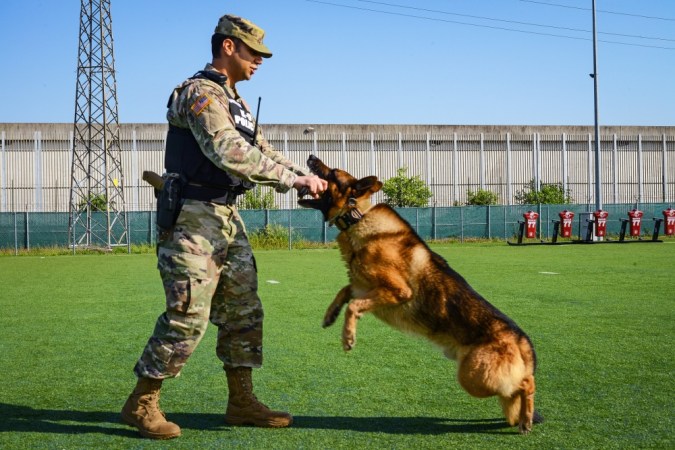Are you aware of the diverse range of unique career paths available in the Marine Corps? Although the Marines are known for their combat arms specialization, there are numerous job opportunities waiting for you as a Marine. Depending on your interests and preferences, you can choose from a variety of exciting job roles during your service. Contrary to popular belief, the USMC offers much more than just infantry service. You may not have considered these amazing career options, but here are some of the lesser-known roles that may pique your interest.
Take a look at these unique career paths in the Marines
Dog Handler
A dog handler is responsible for working with military working dogs. Full-stop this is the best job around! Who doesn’t want to hang out with dogs all day? Okay, so it’s not all gravy all the time. That’s because dog handlers have to have a deep understanding of dogs and dog behavior. It’s also ideal if you know how to train them. That’s on top of being able to form and maintain close bonds with their dog. If you’re a USMC dog handler, you’ll need to maintain the health and well-being of your dog. You’ll also have to get them ready to deploy. Military working dogs have to be ready for any mission that comes their way. It’s a demanding job but if dogs are your life, this unique career path is perfect for you.

Explosives Disposal
Did you know today’s warfare is more dangerous than it was a thousand years ago? It’s true. Whereas the battlefields of yore might be littered with swords and lances, today’s service members have a whole lot more to worry about. These threats include IEDS, bio threats, and even radioactive materials. Explosive Ordnance Disposal Specialists work to neutralize these threats.
An explosive disposal Marine, also known as an Explosive Ordnance Disposal (EOD) Technician, helps clear that up. In this job, you’ll detect, identify and dispose of EODs. This includes bombs and land mines, both in combat and non-combat situations. You’ll train on a wide range of explosives. Overall, your primary objective is to protect military personnel and civilians from harm. EOD Marines also conduct post-blast investigations to determine the type and source of the explosive. You might work with local law enforcement agencies to gather evidence related to explosive incidents.
This is a unique career path because it’s only open once you’ve advanced to the rank of corporal. You’ll then have to undergo an in-person screening and demonstrate advanced physical fitness. If you can cut the mustard and land the job, expect rewarding yet dangerous work.
Parachute Rigger
A parachute rigger is a Marine responsible for packing and maintaining various types of parachutes used in airborne operations. This unique career path is often overlooked. However, this is a critical job! You’ll ensure parachutes are in proper working condition and packed correctly. You’ll also perform routine maintenance and repairs to ensure the safety and reliability of the equipment. Additionally, you might help train other Marines on the proper use and maintenance of parachutes, as well as the procedures for safe parachute jumps. They play a crucial role in ensuring that Marines can perform airborne operations safely and effectively.
If you want this job, you’ll have to complete the Basic Airborne Training at Fort Benning Georgia and rigger courses at Fort Lee, Virginia.

Information Assurance Technician
In an era in which the internet has accelerated globalization, it should come as no surprise that cyber-attacks are on the rise. The military’s digital communications require constant monitoring and protection. If you find yourself serving as an information assurance technician, you’ll likely advise commanding officers as to what cyber security protocols to follow. You’ll also be on the lookout for threats to the military’s cyber database.
This isn’t the most unique career path since technology is all around us. But it’s one that’s critical for mission and country safety. Your main job is being responsible for ensuring the security and integrity of the Marine Corps’ computer and information systems. You’ll work protect against cyber-attacks and other security threats, by conducting vulnerability assessments, implementing security measures, and monitoring network activity. You might also train other Marines on best practices for information security.
You may have joined the Marines expecting a position as a rifleman. So if that’s what you’re after, rest east! But, like all other branches of the military, there’s a lot more than just combat arms. From explosive disposal technicians to multimedia illustrators, the Marine Corps has a variety of unique career paths that cater to different interests, backgrounds, and skill sets.
These jobs not only provide unique experiences and challenges but also offer opportunities to serve the country in meaningful ways. If you are considering a career in the military, it is worth looking beyond the traditional roles and considering some of these lesser-known but equally important jobs.


























